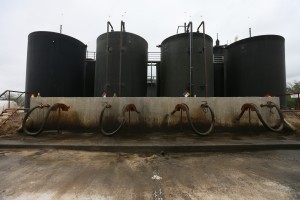Senate Passes Fracking Wastewater Pipelines Bill

Photo by Jennifer Whitney/Texas Tribune
Each day, dozens of trucks hook up to the Gulf Coast-run fracking fluid disposal well site near Gonzales, TX. A new bill would make it easier to transfer the wastewater by pipeline instead of by truck, potentially reducing roadway damage.
Update: The Senate unanimously approved SB 514 from the floor this afternoon, according to a representative from Sen. Davis’ office.
Original Story: A bill that would reform how fracking wastewater moves to disposal wells could pass through the state Senate today.
SB 514, introduced by state Sen. Wendy Davis, D- Fort Worth, would expand the use of pipelines to transport oil and gas waste to disposal wells. The bill was designed to ease the strain tanker trucks transporting waste can cause on some roads.
In the drilling process known as hydraulic fracturing, or “fracking,” millions of gallons of water (along with sand and chemicals) are sent deep underground to break up oil and gas deposits trapped in rock. Some of that fluid comes back up, along with high-salinity water also trapped int those formations. Since it is too dirty to drink, drillers often dispose of it by sending it back underground in a disposal well.
The bill received widespread support in its public hearing in the Texas Senate Natural Resources Committee in April. Representatives from oil companies, environmental groups and energy interests expressed support for the bill. Today it’s likely to be heard on the Senate floor.
Sen. Davis’ office says using more pipelines instead of trucks to transport wastewater will save local and state governments money by reducing road damage and maintenance. For drillers, it will mean less transportation expenses, her office said, and it will also result in less air and noise pollution and truck traffic.
The issue of increased truck traffic is perhaps the biggest complaint for locals living in drilling communities in the midst of the current fracking boom. A report by the Texas Department of Transportation (TxDOT) found that the trucks needed to drill just one well is like adding the traffic of 8 million normal cars to a road, then 2 million cars after that annually to maintain the well. That has put a strain on roads not designed for heavy truck traffic, and it’s also lead to more accidents. In the Eagle Ford region of South Texas, according to numbers data from TxDOT, traffic fatalities were up 40 percent in 2012 from the previous year. Since many of those trucks are carrying drilling wastewater, pipelines could help mitigate the problem.
The Senate put the bill on its “intent calendar” for this week, which means it is prioritized to receive a hearing on the Senate floor. Sen. Davis’ office expects the bill to be heard Thursday.

